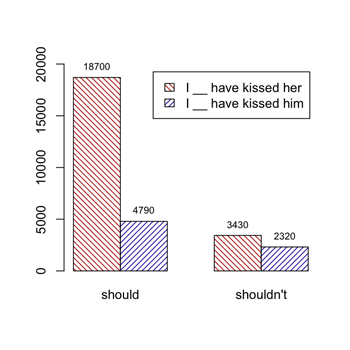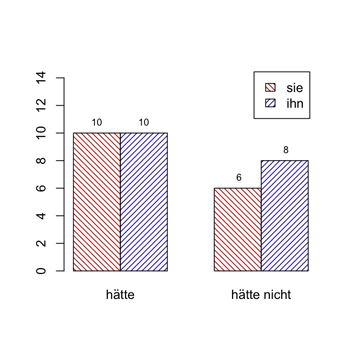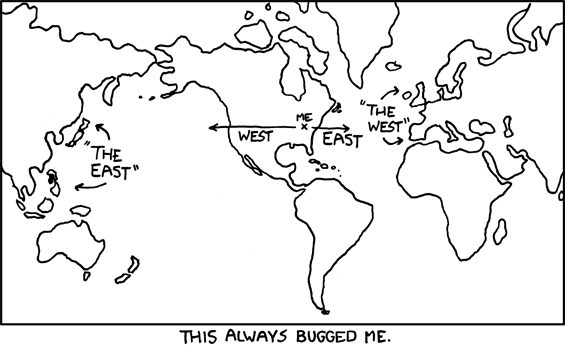Archive for Language and culture
Short-long or long-short?
On Saturday, I was at a workshop on "Brain Rhythms in Speech Perception and Production". One of the participants was Aniruddh Patel, author of Music, Language and the Brain. His presentation was "Rhythms in Speech and Music", and one of the papers that he discussed was John Iversen, Aniruddh Patel, and Kengo Ohgushi, "Perception of rhythmic grouping depends on auditory experience", JASA 123(4): 2263-2271, 2008.
Unfortunately, I had to leave that workshop early, in order to travel to Düsseldorf for the Berlin 6 Open Access conference, where I am now. As I was leaving, Aniruddh gave me a reprint of the Iversen et al. paper, and asked for comments. So I'll keep up my act as "the Madonna of linguists" (even though the reviews to date have been mixed), and offer my comments in the form of a blog post.
Read the rest of this entry »
Phinallie
Yesterday afternoon, as I tried to stay warm on the sidelines of a junior-high soccer game, another father and I discussed the upcoming continuation of the fifth World Series game, suspended in a 2-2 tie by a downpour, two days earlier, after the top half of the sixth inning.
"Seems like they ought to win", I said, "with four at-bats versus three for the Rays."
The response: "You're not from here, are you?"
Read the rest of this entry »
Bad language
I recently objected to Louis Menand's assertion that "[P]rofessional linguists almost universally, do not believe that any naturally occurring changes in the language can be bad" ("Menand on linguistic morality", 10/22/2008). And I was quickly taken to task in the comments by Steve Dodson, who is the erudite and broad-minded author of the Language Hat blog. Hat (as he's called in the blogosphere) asserted that
I personally am happy to sign on to the Descriptivist position as "caricatured" and state that there is no such thing as bad language change. […] To say any form of language change is "bad" is to be ipso facto unscientific.
He also suggested that my acquaintances and I belong to "a small sample of linguists who have … weirdly quasi-prescriptivist views about language".
Read the rest of this entry »
That ol' de-/pre- thing
In response to this morning's discussion of 'scriptivism, John Lawler wrote to remind me of a 2001 sci.lang posting by Arnold Zwicky, which John describes as "the best and most judiciously parsed short statement of the problem that I know of".
Read the rest of this entry »
The Most Common Bisyllabic Terms in Chinese
Below is a list of the hundred most frequent bisyllabic terms in Modern Standard Mandarin. The list is based on a recent frequency study of material from wire feeds taken off several of the main Chinese language news services. Ultimately, I think that the data were provided by LDC.
My purpose in sharing this list is not for purely analytical reasons, but more to give an idea of how, through an examination of relative word frequencies, we can get a sense of what is important for contemporary China. Focusing on bisyllabic terms is more revealing in this regard than if we were to include monosyllabic terms, since the latter tend to be particles or function words of very high frequency (e.g., DE的, DE地, DE得, ZHE4這, NA3/4那, SHI4是, and so forth).
Read the rest of this entry »
Willimantic
Last night's somewhat tame debate drove Gail Collins into a speculative reverie ("McCain: Bearish on Debates", 9/27/2008). Her ending:
Imagine what would happen if a new beetle infested the Iowa corn crop during the first year of a McCain administration. On Monday, we spray. On Tuesday, we firebomb. On Wednesday, the president marches barefoot through the prairie in a show of support for Iowa farmers. On Thursday, the White House reveals that Wiley Flum, a postal worker from Willimantic, Conn., has been named the new beetle eradication czar. McCain says that Flum had shown “the instincts of a maverick reformer” in personally buying a box of roach motels and scattering them around the post office locker room. “I can’t wait to introduce Wiley to those beetles in Iowa,” the president adds.
On Friday, McCain announces he’s canceling the weekend until Congress makes the beetles go away.
Barack Obama would just round up a whole roomful of experts and come up with a plan. Yawn.
Apparently Ms. Collins thinks of Willimantic as the only place in America more remote and intrinsically funny than Wasilla, Alaska.
Read the rest of this entry »
Something I missed
Back in August, Anatol Stefanowitsch at Bremer Sprachblog extended xkcd's classic research on the nature of regret by adding the dimension of gender, and by comparing English to German ("Je Ne Regrette Rien", 8/17/2008):
 |
 |
 |
(Click on the images for larger versions.)
Read the rest of this entry »
How to turn Americans into Asians (or vice versa)
Continuing to follow up on the issues raised by David Brooks' column "Harmony and the Dream", I recommend some interesting reviews by Daphna Oyserman and her colleagues. Among her many publications on culture I found two articles that are especially relevant.
Read the rest of this entry »
One question, two answers, three interpretations
My reactions to David Brooks' August 11 column "Harmony and the Dream" led me to look again at three books by prominent psychologists: Richard E. Nisbett's 2003 The Geography of Thought: How Asians and Westerners Think Differently and Why; and James R. Flynn's 2007 What is Intelligence? Beyond the Flynn Effect; and Alexander Luria's 1976 Cognitive Development: Its Cultural and Social Foundations.
I looked at Nisbett's book because it's the intellectual foundation of Brooks' column; and at the Flynn and Luria books because… well, you'll see.
There's no reference to Flynn in Nisbett's book; and Nisbett is not in Flynn's book either. Yet both are crucially concerned with how people in different places, times and social contexts interpret similarities, especially as judged by certain kinds of psychological test instruments. And both books draw important ideas, with attribution, from the same place: the research of a couple of Soviet psychologists, Lev Vygotsky and Alexander Luria, who studied the cognitive effects of modernization in Uzbekistan and Kirghizia (now the Kyrgyz Republic) in the 1930s.
Given Nisbett and Flynn's well-deserved prominence, and the importance of the various phenomena at issue, and the similarity (and common origin) of their ideas, I'm curious about the mutual lack of reference. But in this post, I'm not going to say anything more about this odd lack of explicit discussion of a strong implicit connection. Instead, I'll limit myself to a sort of catalogue of quotations from various relevant sources.
Read the rest of this entry »
David Brooks, Social Psychologist
According to David Brooks, "Harmony and the Dream", NYT, 8/11/2008:
The world can be divided in many ways — rich and poor, democratic and authoritarian — but one of the most striking is the divide between the societies with an individualist mentality and the ones with a collectivist mentality.
This is a divide that goes deeper than economics into the way people perceive the world. If you show an American an image of a fish tank, the American will usually describe the biggest fish in the tank and what it is doing. If you ask a Chinese person to describe a fish tank, the Chinese will usually describe the context in which the fish swim.
These sorts of experiments have been done over and over again, and the results reveal the same underlying pattern. Americans usually see individuals; Chinese and other Asians see contexts.
When the psychologist Richard Nisbett showed Americans individual pictures of a chicken, a cow and hay and asked the subjects to pick out the two that go together, the Americans would usually pick out the chicken and the cow. They’re both animals. Most Asian people, on the other hand, would pick out the cow and the hay, since cows depend on hay. Americans are more likely to see categories. Asians are more likely to see relationships.
Those who've followed our previous discussions of David Brooks' forays into the human sciences ("David Brooks, Cognitive Neuroscientist", 6/12/2006; "David Brooks, Neuroendocrinologist", 9/17/2006) will be able to guess what's coming.
In this case, Mr. Brooks has taken his science from the work of Richard E. Nisbett, as described in his 2003 book The Geography of Thought: How Asians and Westerners Think Differently and Why, and in many papers, some of which are cited below. I was familiar with some of this work, which has linguistic aspects, and so I traced Brooks' assertions to their sources. And even I, a hardened Brooks-checker, was surprised to find how careless his account of the research is. The relation between Brooks' column and the facts inspired me to model my discussion after the Radio Yerevan jokes that arose in the Soviet Union as a way to mock the pathetically transparent spin of the Soviet media:
Question to Radio Yerevan: Is it correct that Grigori Grigorievich Grigoriev won a luxury car at the All-Union Championship in Moscow?
Answer: In principle, yes. But first of all it was not Grigori Grigorievich Grigoriev, but Vassili Vassilievich Vassiliev; second, it was not at the All-Union Championship in Moscow, but at a Collective Farm Sports Festival in Smolensk; third, it was not a car, but a bicycle; and fourth he didn't win it, but rather it was stolen from him.
Read the rest of this entry »
Sword out of the stone
The war in South Ossetia reminded me of the disputed Sarmatian connection to the King Arthur legends — a good story, whether or not it's true. (More on this here.) And the Wikipedia article on the Ossetians says that "Joseph Stalin's parents are believed to have been ethnic Ossetians albeit assimilated into Georgian culture". I first learned about this in Simon Sebag Montefiore's Young Stalin, which I read not long ago. According to Montefiore, Stalin's paternal great-grandfather "was an Ossetian from the village of Geri, north of Gori". In a footnote on p. 21, Montefiore expands on this:
When Stalin's dying father [Vissarion "Keke" Djugashvili] was admitted to hospital, significantly he was still registered as Ossetian. Stalin's enemies, from Trotsky to the poet Mandelstam in his famous poem, relished calling him an "Ossete" because Georgians regarded Ossetians as barbarous crude and, in the early nineteenth century, non-Christian.
Read the rest of this entry »
8/8/8
Inspired by Geoffrey Pullum's plan to take Barbara her matutinal coffee at exactly 08:08:08 on the morning of 08/08/08, this morning at 08:08:08 a.m. I took 8 photographs of my wife standing next to our favorite orchid, which has had a total of 8 blossoms.
Yes, everything is coming up 8's today. The morning news made a big fuss over how the uniforms of the American Olympians consist of 8 pieces. And everybody (except perhaps Mark Spitz and a billion Chinese) is rooting for Michael Phelps to win 8 gold medals. And today, of course, is very special for New York Times reporter Jennifer 8. Lee who, by the way, wrote an excellent article back in 2001 about the impact of computers on the ability of Chinese to write characters by hand.
The airwaves are full of instant pundits informing us how important 8 is for Chinese because BA1 八 sounds like FA1 发/發 and FA1, among many other things too numerous to list here, can mean "get rich, make a fortune, become wealthy." So as not to sound too crass, those who explain the Chinese attachment to 8 usually say that it signifies "prosper(ity)" — I guess a lot depends upon what one understands "prosper(ity)" to mean! One hears this sort of sentiment most often during Chinese New Year celebrations when people go around saying (and writing endlessly on greeting cards) GONG1XI3 FA1CAI2, Cantonese GONGHAI/HEI FAT CHOI 恭喜发财 ("Congratulations and May You Get Rich!").
Read the rest of this entry »
